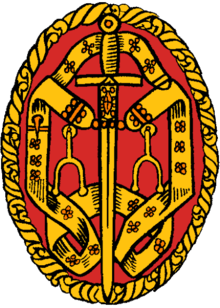Hugh Bayley
| Sir Hugh Bayley | |
|---|---|
 | |
| Member of Parliament for York Central (2010– 2015) City of York (1992–2010) | |
|
In office 9 April 1992 – 30 March 2015 | |
| Preceded by | Conal Gregory |
| Succeeded by | Rachael Maskell |
| Majority | 6,451 (13.9%) |
| Personal details | |
| Born |
9 January 1952 Maidenhead, Berkshire, England |
| Nationality |
|
| Political party | Labour |
| Spouse(s) | Fenella née Jeffers |
| Alma mater |
University of Bristol; University of York |
| Religion | Christian (Anglican) |
| Website | hughbayley.co.uk |

Sir Hugh Nigel Edward Bayley[1] (born 9 January 1952) is a British Labour Party politician who was Member of Parliament for York Central until 2015, having held the predecessor City of York seat from 1992 to the 2010 general election, when boundary changes took effect.
Early life
Bayley was born in Maidenhead, Berkshire and was educated at Haileybury and Imperial Service College, the University of Bristol, where he obtained a Politics BSc degree in 1974, before pursuing further studies at the University of York where he was awarded a BPhil degree in Southern African Studies in 1976. After his studies in 1975 he became a District Officer and later a National Officer with NALGO until 1982.
Bayley was elected as a Councillor in the London Borough of Camden in 1980 and became the General Secretary of the International Broadcasting Trust in 1982. Bayley stepped down as a councillor and moved to York to take up a post as Research Officer in Health economics at the University of York from 1987–92. He was a lecturer in Social Policy at the University from 1986 until 1998.
Parliamentary career
Hugh Bayley was nominated as the Labour candidate for York at the 1987 general election but was defeated by just 147 votes by the Conservative Conal Gregory. After the election, Hugh Bayley became a Health Economics Research Fellow at the University of York, and became a member of the local health authority.
Conal Gregory and Hugh Bayley again fought it out at the 1992 general election in York and this time Bayley won by a comfortable margin. After his election he made his maiden speech on 7 May 1992 and joined the Health Select Committee. The name of the York constituency was changed (though with unaltered boundaries) and Bayley won a majority of over 20,000 at the 1997 general election.
After the election, Bayley became the Parliamentary Private Secretary to the Secretary of State for Health Frank Dobson, who lived near York. In 1998 he was appointed to Tony Blair's Government as the Parliamentary Under Secretary of State in the Department of Social Security, responsible for Incapacity, Maternity, Disability benefits and Vaccine damage.[2] He was deputed to bring the Welfare Reform and Pensions Bill through the Commons, which attracted much criticism from backbench Labour MPs over plans to means-test and restrict access to incapacity benefit.[3][4] He was dropped from government after the 2001 general election.
Bayley has since served on the International Development Committee and pioneered the foundation of the Africa All Party Parliamentary Group, serving as Chair for several years, now being its vice-chair. He was President of the NATO Parliamentary Assembly from November 2012 to 2014.[5] He was also a Chairman of the Public Bill Committee. The City of York constituency was abolished in 2010, with Bayley being elected in the 2010 general election to represent the successor constituency York Central.
A loyal backbencher, Bayley rarely voted against his party whip.[6]
At the outset of the 2010 parliament, Speaker of the House of Commons John Bercow appointed Bayley as a temporary Deputy Speaker to serve for two weeks until the election of Deputy Speakers.[7] Bayley accepted the appointment, but stated that he would serve only temporarily and would not run for a Deputy Speakership, as he preferred to be able to represent his constituents by speaking out on issues before the House.[8]
On 5 December 2014, Bayley announced his intention to stand down as a Labour MP at the 2015 general election.[9]
Bayley was knighted in the 2015 New Year Honours for his "services to parliamentary engagement with NATO".[10][11][12]
Personal life
Sir Hugh was active in the Anti-Apartheid Movement in his student days and remains a lover of jazz.
On 22 December 1984, in Camden, he married Fenella Jeffers from Nevis; they have a son and a daughter.
References
- ↑ http://www.bbc.co.uk/news/uk-politics-30632219
- ↑ "UK Politics – Department of Social Security". BBC. 15 October 1999. Retrieved 5 December 2014.
- ↑ Paul Waugh and Sarah Schaefer (18 May 1999). "Ministers 'panic' on benefits revolt". The Independent. Retrieved 5 December 2014.
- ↑ Michael White (11 January 2000). "Minister offers £5m welfare concession". The Guardian. Retrieved 5 December 2014.
- ↑ "Hugh BAYLEY". NATO Parliamentary Assembly. Retrieved 5 December 2014.
- ↑ Hugh Bayley MP, York Central (TheyWorkForYou.com)
- ↑ http://www.parliament.uk/documents/commons/lib/research/briefings/snpc-05375.pdf p.9
- ↑ Deputy Speaker role for York Central MP Hugh Bayley (From York Press)
- ↑ "Hugh Bayley to stand down as Labour MP". Retrieved 5 December 2014.
- ↑ The London Gazette: (Supplement) no. 61092. p. N2. 31 December 2014.
- ↑ 2015 New Year Honours List
- ↑ "New Year Honours: Lord Ashdown among politicians recognised". Retrieved 31 December 2014.
External links
- Hugh Bayley's official site
- Debrett's People of Today
- Profile at Parliament of the United Kingdom
- Contributions in Parliament at Hansard 1803–2005
- Current session contributions in Parliament at Hansard
- Voting record at Public Whip
- Record in Parliament at TheyWorkForYou
- Profile at Westminster Parliamentary Record
News items
| Parliament of the United Kingdom | ||
|---|---|---|
| Preceded by Conal Gregory |
Member of Parliament for the City of York 1992–2010 |
Constituency abolished |
| New constituency | Member of Parliament for the York Central 2010–2015 |
Succeeded by To be elected |